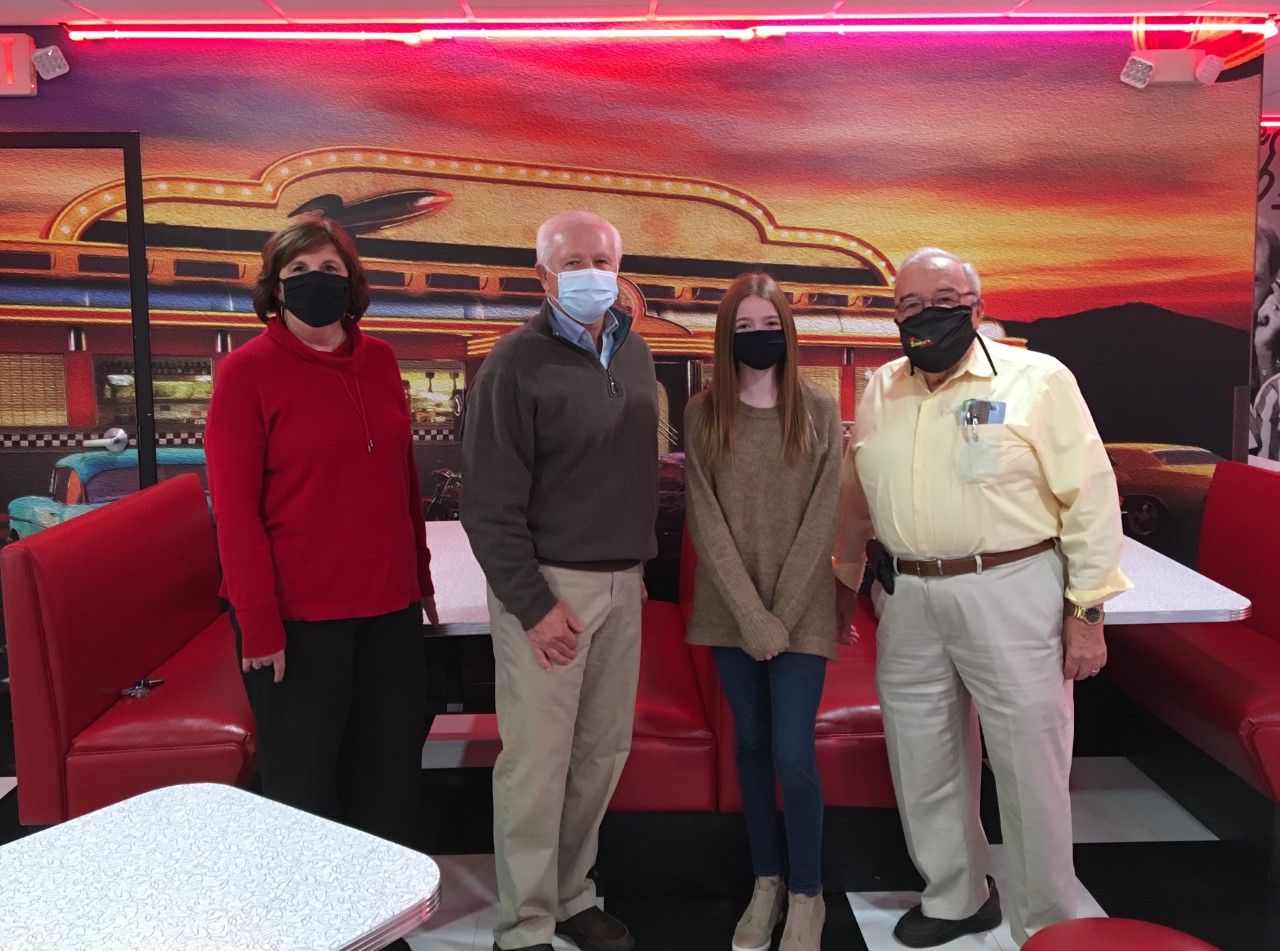
Pictured left to right: Barb Harpster (Media Consultant, Altoona Mirror),
Joe Meadows (Partner, The Meadows Original Frozen Custard of Hollidaysburg),
Courtney Irwin (Essay Contest Winner), The Late Fred Imler Sr. (Former President, Imler’s Poultry)
Congratulations to Courtney Irwin, an 8th grader at Altoona Area Junior High School, whose essay was chosen out of 80 entries as the winner of the Altoona Mirror and Operation Our Town Essay Contest!
Courtney received $250 in gift cards to The Meadows Original Frozen Custard in Hollidaysburg. Co-sponsors of the Essay Contest were the Altoona Mirror, Imler’s Poultry, and The Meadows Original Frozen Custard in Hollidaysburg.
Below is Courtney’s winning essay on why people give in to peer pressure from those who use drugs and some of the best ways to avoid giving in to peer pressure:
You walk over to the lunch table and sit at your usual seat. Everybody is huddled over Stacy, acting suspiciously.
“What is it?” You ask. People shift to create a gap in the group. In Stacy’s hand, you see a black rectangle with a colorful tip. Your stomach sinks. You know what it is. It’s the newest trend, a Juul. They have been all over the news. The pods are filled with nicotine, a highly addictive drug.
“I got it from my brother,” Stacy whispers. “Wanna try?” She hands it to you while everyone stares, daring you to try it. How do you say no? What are you supposed to do?
As people grow older, they come across situations like these more often. Should you give in? Should you say no and be “lame”? While education evolves more every year, students should still be properly educated on peer pressure. Minors are the most vulnerable to peer pressure, and should go into situations knowing how to react.
What is peer pressure and why do kids give in so easily? The dictionary defines peer pressure as influence from the members of one’s group. Not all peer pressure is bad. For example, a crowd encouraging an apology is fine. Convincing someone to do something they do not want to is wrong. Children give into peer pressure for many reasons. They could give into it because they want to fit in and are scared of being bullied.
Being educated on peer pressure is essential to detecting it. Determining that someone is being peer pressured is hard. You might notice changes in personality, such as becoming more secretive, changes in attitude and language, and expressing emotions that are out of character. People may also spend more time with a new group. Drug use is a sign. If you notice any of these changes, pay attention for more.
Avoiding peer pressure is challenging because there are always going to be bad people who want you to do bad things. In most situations, you can use common sense. If something seems wrong, say no. You can make new friends. Being afraid of being shunned is no reason to do something wrong. There will always be more opportunities to find friends, but there will be less opportunities to fix mistakes. Maintaining inner strength and self confidence is an important part of denying peer pressure. If you end up getting involved, talking to another person that stands with you might help. There is always a way out.
When your friends try to get you to Juul, you say, “No thanks.” They might call you lame, but because you are educated, you understand being considered lame is better than the alternatives. If they bully you, you can leave. Having the bravery to say no might encourage others to say no, making room for positive peer pressure. You could inform an adult. While saying no to peer pressure takes strength, you will feel better in the long run.
Works Cited
“Dealing With Peer Pressure (for Kids) – Nemours KidsHealth.” Edited by D’Arcy Lyness, KidsHealth,
The Nemours Foundation, July 2015, kidshealth.org/en/kids/peer-pressure.html.
“Signs of Peer Pressure & How to Help Stark County Teens.” Stark Help Central, 27 Sept. 2019,

